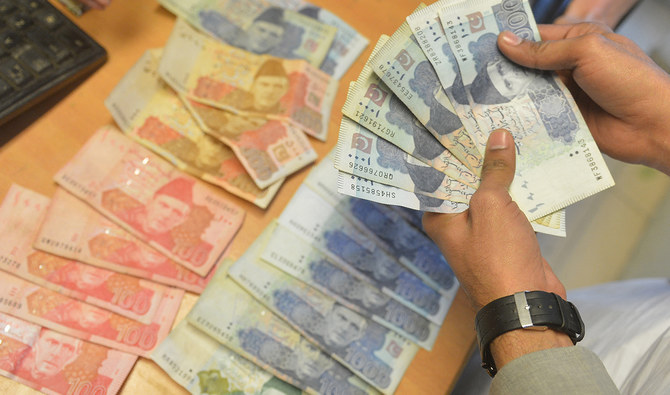KARACHI: The stability of Pakistan’s currency and international bonds is linked with a successful second review of the country’s ongoing International Monetary Fund (IMF) program and a peaceful transition of government after this week’s national elections, financial experts said on Tuesday.
Pakistan’s rupee has regained its value by 9 percent to about Rs279 against the US dollar from an all-time low of Rs307 in September last year, due to the government’s clampdown on illicit foreign currency trade and smuggling, completion of first review of the ongoing $3 billion IMF program and inflows from various sources.
Similarly, Pakistan’s international bonds also posted gains and remained top performer in Asia in Jan 2024, according to the analysts and Bloomberg data. The investors got almost 100 percent returns in 2023.
The South Asian nation of more than 241 million is now set to go to the ballot box on Feb 8 to elect a new government that is widely expected to negotiate a new IMF bailout after the current short-term facility expires in March.
Pakistani analysts believe the stability of the national currency and the bonds is based on the IMF review, which is due this month, and a smooth transition of the government.
“If the review goes smooth then chances are bright that the IMF and the new government will strike a new long-term deal,” Muhammad Sohail, chief executive officer (CEO) of the Karachi-based Topline Securities brokerage house, told Arab News.
“If that happens, I don’t see any substantial pressure on the Pakistani rupee and Eurobonds.”
However, Shahid Ali Habib, CEO of the Arif Habib Limited brokerage and securities firm, believes the rupee may still shed 4-6 percent of its value due to the interest rate differential and high inflation.
“A natural rupee devaluation has to take place because of the interest rate differential and high inflation rate that is likely to close the year at around 24 percent,” Habib told Arab News.
“I don’t see any sudden devaluation.”
He said the next IMF program was important for fiscal stability in Pakistan, warning that without it the situation would worsen to what it was in June last year, when Pakistan barely averted a sovereign debt default.
“I hope the next government will negotiate a fresh program with the IMF spanning over 4-5 years,” Habib added.
Pakistan’s caretaker finance minister, Dr. Shamshad Akhtar, has also hinted recently that the South Asian country may need a new IMF program.
Samiullah Tariq, a director at the Pakistan Kuwait Investment Company, believed a peaceful conduct of elections and a smooth transition of power would lead to capital market stability.
“There should be no problem in negotiating a new program with the IMF, because the things are under control,” he told Arab News.
The analyst, however, warned that any uncertainty may dent the performance of the country’s dollar bonds in the international market.
Pakistan’s $1 billion dollar-denominated bond is maturing on April 15 this year. Last week, the central bank governor assured that the country was in a “comfortable position” to pay the amount upon the maturity of the bond.
















